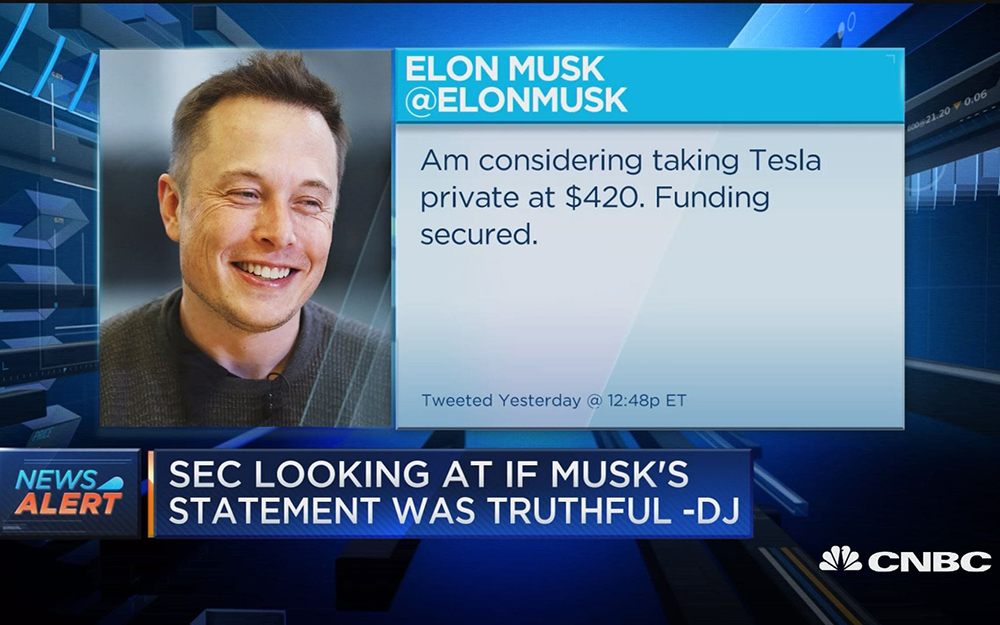
By Haddon Libby
Elon Musk recently tweeted that he was taking Tesla private at $420 per share and that the funding was secured. This series of tweets caused the stock to go up by $36 per share, increased his personal net worth (albeit briefly) by nearly $1 billion, widened an SEC investigation into Tesla for making misleading statements to the public and caused those who shorted Tesla stock to lose hundreds of millions of dollars.
If Tesla does not have the funding secured, Musk committed fraud. As he and the company have not been able to produce any verifiable documentation that funding is secured, Tesla stock has fallen back to its pre-420 levels while emboldening Tesla’s detractors and making more difficult for Tesla to pull off the incredibly difficult task that it undertook when starting fifteen years ago.
To understand where the Tesla story is headed, let’s review facts. To start, how can someone sell a stock that they do not own?
Someone who owns the stock lends it to the short seller. The short seller eventually has to buy the stock in order repay whoever lent the stock to them. The short seller therefore makes money when the stock price goes down but loses money when the stock price goes up.
Tesla is the most shorted stock in the world. So many shares have been shorted that you cannot short the stock today even if you wanted to. Many analysts believe the stock is worth no more than half of its current value.
At present, Tesla and Musk appear to be facing cash crunches. While Tesla had $2.2 billion in cash at the end of June, their financial filings listed $10.9 BILLION in debt. For the first six months of this year, Tesla had revenues of $7.4 billion and an operating loss of $1.1 billion. This means that their costs of making and selling cars, solar panels and lithium batteries were 15% more than they earned. As such, Tesla had to borrow more money to run the business as well as service the debt.
At a $350 per share, Tesla is valued at approximately $60B (billion). For comparison, Daimler (aka Mercedes) is worth $70B, Honda $53B, General Motors $50B, Ford $38B and Nissan $37B.
So far for 2018, Tesla sold 70,000 cars globally while Ford sold 220,000 vehicles in the US in JUNE ALONE (Nissan 134,000, Honda 132,000, Daimler 29,000). Meanwhile, Tesla sold 11,000.
As Musk does not take a salary or sell his shares, how does he afford the lifestyle of a globe trotting billionaire?
He borrows lots and lots of money.
Led by Morgan Stanley, banks take his stock in Tesla and use that as collateral for loans. According to SEC filings by Musk, 13 million of his 33 million shares are pledged against loans. While we do not know how much he has borrowed, a 50% advance rate on 13 million shares totals $2.2 billion. This seems close as Musk borrowed $625 million in 2017, $486 million in 2016, $475 million in 2015 and $650 million more over the previous three years. Since Musk lives on debt without a meaningful salary, he still has to pay taxes on the billions that he has borrowed.
If all of that does not make you concerned about Tesla’s future, Vickers Insider Trading reports that most insiders at Tesla except for Musk have sold shares this year.
When you consider that Tesla is tight on cash and has $11 billion in debt; the stock is the most shorted in the world, and Musk could be forced to sell his shares if the stock price drops by $100 per share, you can see why Musk sent a tweet stating that he has secured the financing to go private – he is in a bit of a pickle. He cannot issue more debt and if he issues more stock, he would most likely cause the imminent demise of Tesla.
Musk and Tesla are a reminder that companies built on debt and overly optimistic statements (if not outright fraudulent statements) often come up short.
Haddon Libby is the Managing Partner and Founder of Winslow Drake Investment Management and can be reached at HLibby@WinslowDrake.com. For more information, please visit www.WinslowDrake.com.








































